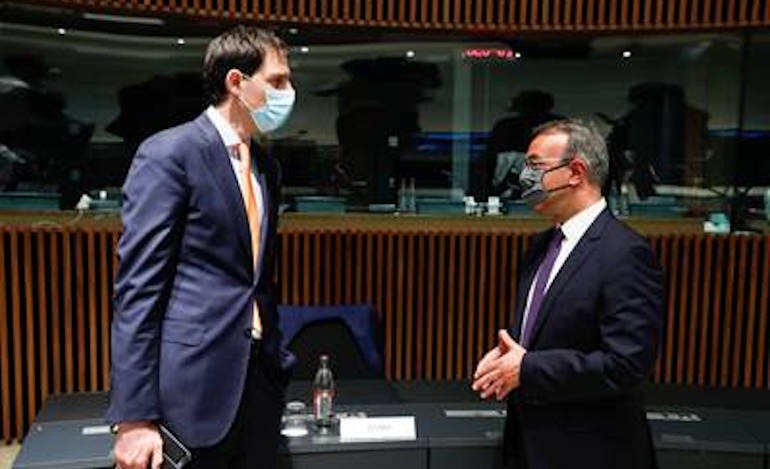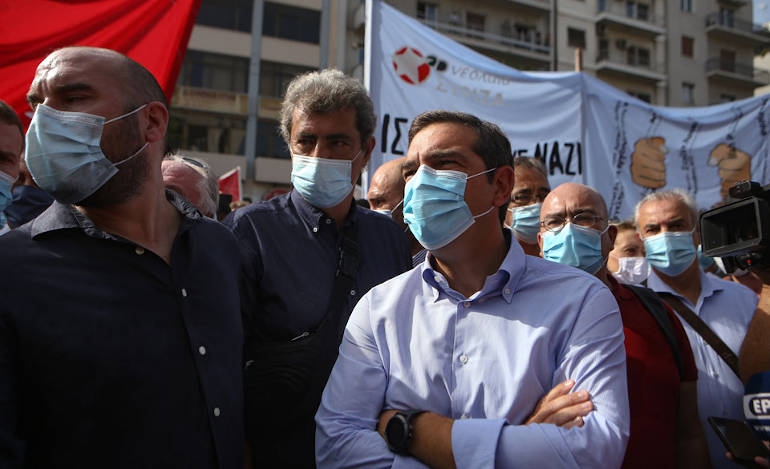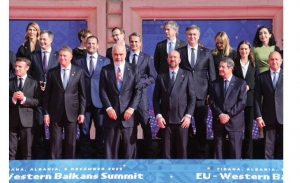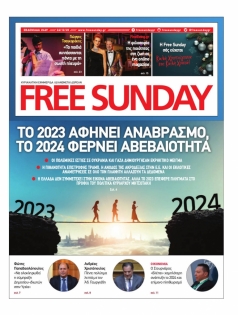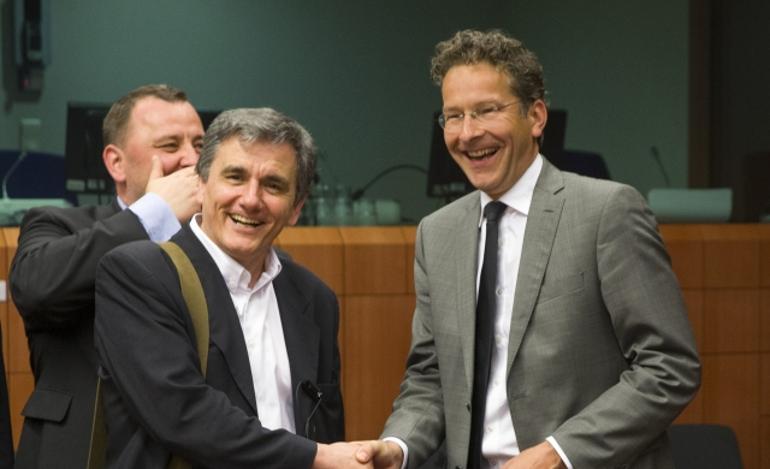
«Το Eurogroup προσδοκά να λάβει ταχύτατα το σχέδιο του συμπληρωματικού μνημονίου»
09/05/2016 19:00 Statements and remarks 228/16 Euro area Economy & finance
The Eurogroup calls upon the institutions and the Greek authorities to complete in the coming days the technical work on the staff level agreement on the first review, including the contingency mechanism. In this context, the Eurogroup looks forward to receive rapidly the draft supplemental MoU, including the final full list of prior actions, as well as the compliance report for the first review. It calls upon the Greek authorities to take immediate steps to implement the prior actions including through the adoption of legislation. Upon full implementation of the prior actions by the Greek authorities and following national procedures where necessary, the Eurogroup stands ready to support the disbursement of the second tranche of the ESM programme.
Ακολουθούν οι δηλώσεις του κ.Νταισεμπλουμ
Welcome to this Eurogroup press conference.
We had an extra Eurogroup specially on the Greek programme. We discussed basically three topics: one is the policy package coming from the agreement which we achieved last summer; second, an additional contingency mechanism and third we had a first discussion on debt and sustainability and what needs to be done there.
So first, on the package the Eurogroup welcomed the agreement that was achieved on the policy package that should now lay the way for the successful completion of the first review of this programme. The first review includes also the implementation of the NPL strategy and the privatization programme. But the core of that package is the pension reform, personal income tax reform and additional fiscal parametric measures. Some of them have been legislated last night in the Greek parliament and the institutions will now complete this part of the process to assess whether everything is in accord with the agreement and to finalize also on the basis of further discussion the additional contingency mechanism.
So a few words on that mechanism: it will be legislated up front; it will ensure that, when necessary on an objective basis, Greece fails to meet the annual primary surplus target in the programme, automatically this mechanism will come into place. It will look at expenditure measures, including non-discretionary measures that can be replaced, at a later time, by structural measures to make sure that the programme, the budget, is structurally back on track and in that structural approach also revenue measures can be put in place.
So, what we did on the contingency mechanism is basically take the last proposal from the Greek government and force it, in our discussions today, to make sure that there is the option of permanent structural measures, agreed with the institutions, including revenue measures which could become effective in the year thereafter. So this is an addition, an amendment to the Greek proposal.
The privatisation programme is also part of the first review we have put in our conclusions today. The Supervisory Board of this Privatisation and Investment Fund will be appointed by June 2016 and the fund will become fully operational not later than September this year.
Then on debt we had a first round of discussion, looking at the necessity, the timing, the design and the conditionality of debt relief measures. Of course, any measures will be conditioned upon full completion, full implementation of the measures agreed in the programme and will be considered later on. There were no decisions today.
We agreed on a number of guiding principles: why are we doing this, why are we looking at further debt measures, of course to facilitate, to make it easier for Greece to gain access to the markets again, to smoothen the repayment profile in the coming years, to incentivise the country's adjustment process and to accommodate uncertain GDP growth and interest rate developments in the future.
What we will do in the coming weeks -- the EWG will be asked to do that work with the experts -- is to design and establish a benchmark according to which under the baseline scenario of a debt sustainability analysis Greece's gross financing needs should remain on a sustainable path. So if you remember, in 2012 we talked about having a cut or reducing the debt to GDP in a percentage which changes basically the method when looking at the annual debt burden and annual debt service. And we need to make, to develop that method and create a benchmark for it. So that's the first thing that the technical people will have to do.
And then, in today's meeting we discussed the way forward; we foresee a sequence approach: what we could do in the short term, the medium term and the long term. For the short term, it is basically about possibilities to optimize debt management, so the total debt could be further optimized, reducing the cost for the Greek side, making it more manageable in the future. For the medium term, we ask the EWG to explore specific measures, such as (they were already mentioned last summer) longer grace and payment periods, specific measures which can be used if necessary at the end of the programme, so no earlier than 2018. And there were two: one specific point that was mentioned and we will ask the EWG to look at it, and it is the use of SMP and ANFA profits. So this is about what could come into effect at the end of the programme in 2018: specific measures to reduce debt. And the third layer is for the long term: the Eurogroup stands ready, if necessary, and conditional upon compliance with the primary surplus targets, to further assess at the end of the programme the need for possible additional debt measures. So this is at the end of the programme: we will also look ahead and see what could be needed, what approach could be needed to make sure that also in the coming decades Greece stays on track also in terms of debt sustainability. That is a decision to be taken at the end of the programme in 2018. The EWG has a mandate to work further on the technicalities of these three approaches: short term, medium term and long term, and together with the agreement and the implementation of the policy package, this agreement on debt we are going to try to achieve in the next Eurogroup. This agreement on debt and adequate financing assurances by the European partners are expected to allow the IMF to participate in the programme.
Finally, on the outcome of today's meeting, we have, so to speak, two work strands ahead of us: one is to complete all the measures in the short term package and make sure everything is done as agreed, and that could then lead, after a number of procedural steps, to the next disbursement to Greece; and the other work track is, as I said, the EWG would do technical work on debt measures in short term, medium term and long term. So we have two work strands ahead of us and we will meet again in the regular Eurogroup on 24 May and discuss all these issues once again.
- Tags:
- EUROGROUP
- ΑΠΟΦΑΣΗ
- ΑΝΑΚΟΙΝΩΣΗ

